The number of world hungry has dropped to one in eight people, making the goal of halving hunger by 2015 possible despite continued problems in sub-Saharan Africa and Southern Asia, the UN food agency said yesterday.
At the global level, 842 million people — 12 percent of the world’s population — did not have enough food for an active and healthy life, down from 868 million for the period 2010 to last year.
The Rome-based Food and Agricultural Organization (FAO) said it now appeared possible to attain the UN Millennium Development Goal (MDG) of halving world hunger from its 1990 level by 2015.

Photo: AFP
A FAO report said the main reasons were higher economic growth in developing countries, an increase in farm productivity rates and more private and public investments in agriculture.
It also said that remittances from emigrants, which have risen to three times higher than development aid globally, were helping improve diets in countries like Bangladesh and Tajikistan.
“With a final push in the next couple of years, we can still reach the MDG target,” FAO director Jose Grazing da Silva said, along with the heads of the UN rural poverty and UN food aid agencies.
“Policies aimed at enhancing agricultural productivity and increasing food availability, especially when smallholders are targeted, can achieve hunger reduction even where poverty is widespread,” they said in the report.
The report said 62 countries have already reached the target of halving the proportion of hunger. Despite overall progress, marked differences across regions persist, the report said.
“Africa remains the region with the highest prevalence of undernourishment, with more than one in five people estimated to be undernourished,” it found.
Sub-Saharan Africa is currently performing the worst on the hunger scale, though there has been some improvement over the last two decades, with hunger declining from 32.7 percent to 24.8 percent.
In terms of numbers rather than percentages, Southern Asia had the highest number of undernourished people — 295 million — followed by sub-Saharan Africa with 223 million and Eastern Asia with 167 million, the report said.
Progress in Northern Africa, which has been impacted by the economic fall-out from the Arab Spring revolutions, has been slow.
Western Asia meanwhile showed no progress in tackling undernourishment: While there are fewer people going hungry here than in other parts of the region, the level of undernourishment has risen steadily since the 1990 to 1992 period.
The FAO said there had, however, been significant reductions in the estimated number of people going hungry in Latin America and Eastern Asia.
The most rapid progress was recorded in fast-growing economies of Southeastern Asia, where since 1990 the proportion of hungry people has dropped from 31.1 percent to 10.7 percent.
“Those that have experienced conflict during the past two decades are more likely to have seen significant setbacks in reducing hunger,” FAO said.
“Landlocked countries face persistent challenges in accessing world markets, while countries with poor infrastructure and weak institutions face additional constraints,” it added.
As a whole, FAO said the total number of undernourished in developing countries had fallen since 1990 to 1992 by 17 percentage points from 995.5 million to the current level of 826.6 million.

In the sweltering streets of Jakarta, buskers carry towering, hollow puppets and pass around a bucket for donations. Now, they fear becoming outlaws. City authorities said they would crack down on use of the sacred ondel-ondel puppets, which can stand as tall as a truck, and they are drafting legislation to remove what they view as a street nuisance. Performances featuring the puppets — originally used by Jakarta’s Betawi people to ward off evil spirits — would be allowed only at set events. The ban could leave many ondel-ondel buskers in Jakarta jobless. “I am confused and anxious. I fear getting raided or even

Kemal Ozdemir looked up at the bare peaks of Mount Cilo in Turkey’s Kurdish majority southeast. “There were glaciers 10 years ago,” he recalled under a cloudless sky. A mountain guide for 15 years, Ozdemir then turned toward the torrent carrying dozens of blocks of ice below a slope covered with grass and rocks — a sign of glacier loss being exacerbated by global warming. “You can see that there are quite a few pieces of glacier in the water right now ... the reason why the waterfalls flow lushly actually shows us how fast the ice is melting,” he said.

RISING RACISM: A Japanese group called on China to assure safety in the country, while the Chinese embassy in Tokyo urged action against a ‘surge in xenophobia’ A Japanese woman living in China was attacked and injured by a man in a subway station in Suzhou, China, Japanese media said, hours after two Chinese men were seriously injured in violence in Tokyo. The attacks on Thursday raised concern about xenophobic sentiment in China and Japan that have been blamed for assaults in both countries. It was the third attack involving Japanese living in China since last year. In the two previous cases in China, Chinese authorities have insisted they were isolated incidents. Japanese broadcaster NHK did not identify the woman injured in Suzhou by name, but, citing the Japanese

RESTRUCTURE: Myanmar’s military has ended emergency rule and announced plans for elections in December, but critics said the move aims to entrench junta control Myanmar’s military government announced on Thursday that it was ending the state of emergency declared after it seized power in 2021 and would restructure administrative bodies to prepare for the new election at the end of the year. However, the polls planned for an unspecified date in December face serious obstacles, including a civil war raging over most of the country and pledges by opponents of the military rule to derail the election because they believe it can be neither free nor fair. Under the restructuring, Myanmar’s junta chief Min Aung Hlaing is giving up two posts, but would stay at the